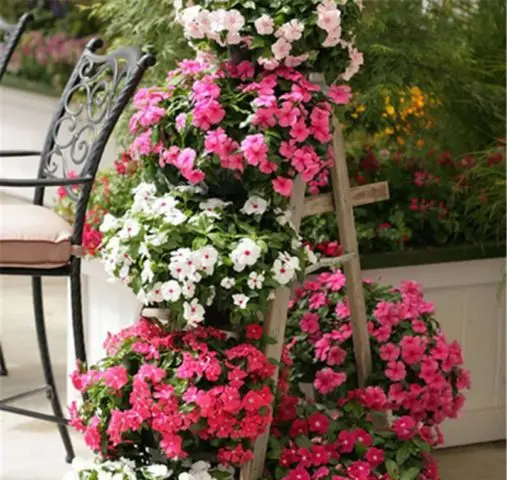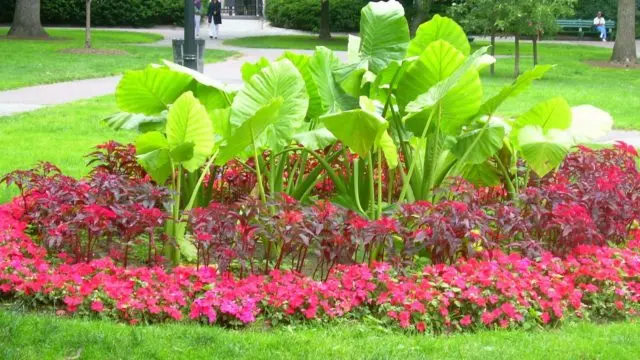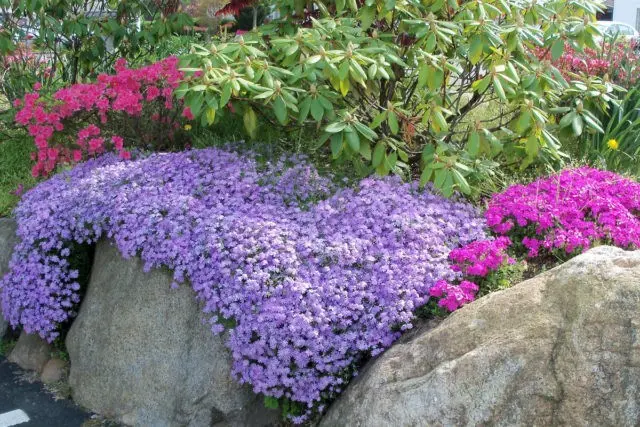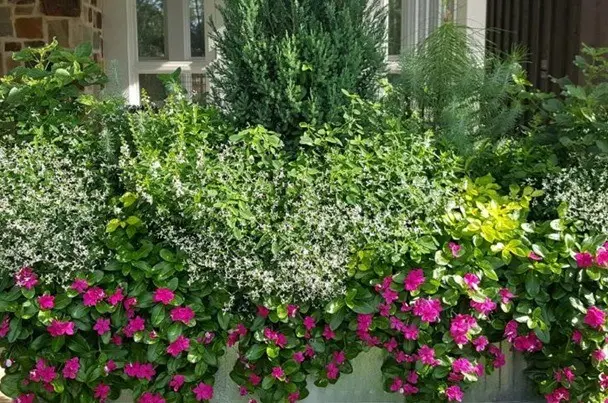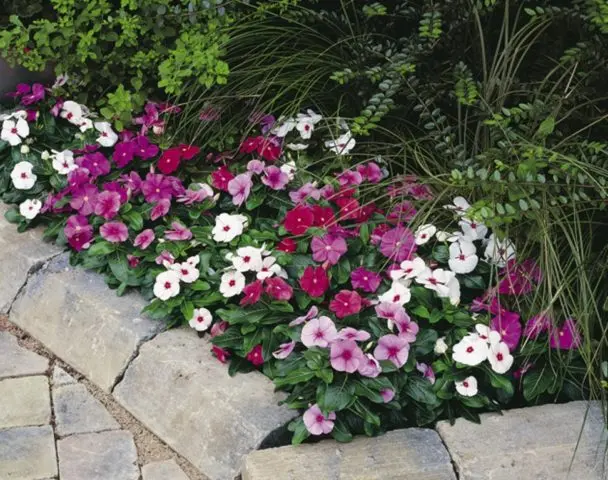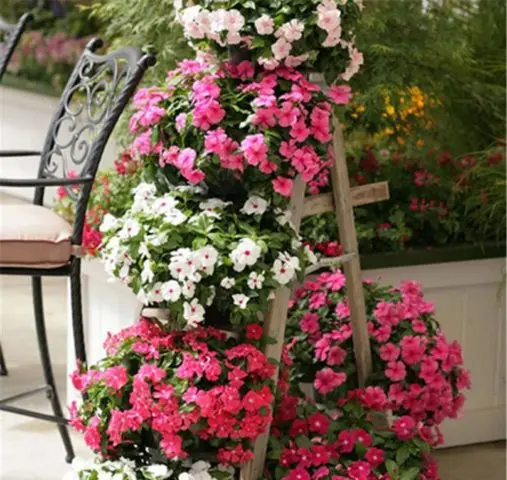Contents
Periwinkle Kiffa is a perennial herbaceous shrub with creeping stems. A variety was created for ampel cultivation. But the culture is also suitable for cultivation in open areas, it is used as a ground cover.
Description
Kiff’s periwinkle (Vinca rosea) or catharanthus is a dwarf variety growing in the form of a herbaceous shrub with creeping shoots. Characteristics of the variety:
- The bush is compact, with high shoot formation, grows to a height of 25 cm, crown diameter – 20 cm.
- The lower stems are located close to the ground, the next weave from above in a chaotic direction. It turns out a pillow-shaped dense curtain of green mass.
- Periwinkle Kiffa is a densely leafy plant, the leaves are collected in rosettes of 3-5 pieces, the plates are hard, glossy, lanceolate, dark green. They do not change color with the onset of autumn, go under the snow and retain their appearance until spring.
- The flowers are simple, five-petalled, lilac or dark pink, quite large for a dwarf form, diameter within 4,5 cm. Located in the leaf axils. In the flowering phase, the bush is completely covered with a purple cloud.
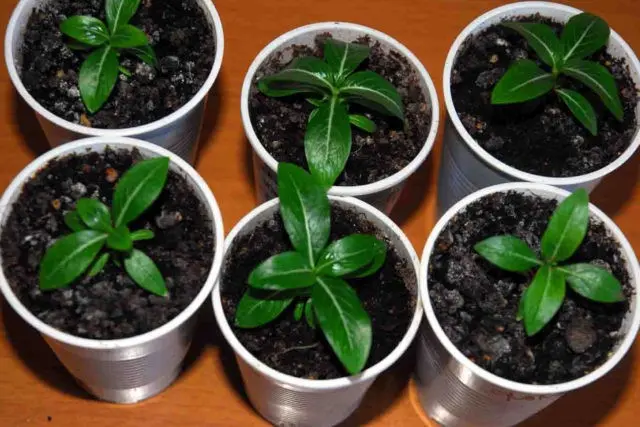
Periwinkle blooms in May, the buds do not bloom at the same time, the cycle lasts until June, in the south in autumn budding resumes
Cultivation from seeds
Basically, a generative method of reproduction is used. Planting material germinates well, but not together. To speed up the process, grow periwinkle seedlings or sow seeds immediately on the site. Sowing time is guided by the weather conditions of the region. The Kiff variety will be ready for planting in 1,5 months.
Seedlings are determined for the plot in the spring, after the establishment of warm weather. For seedlings, seeds are sown in containers filled with a nutrient substrate. They germinate at +20-250 C.
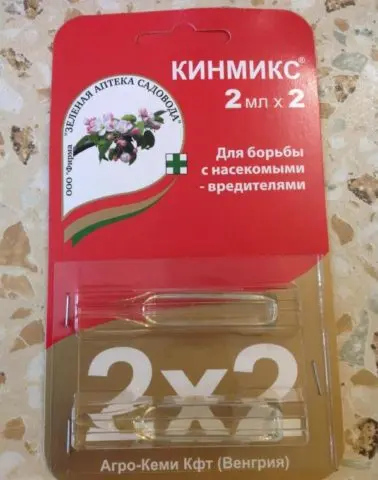
After the formation of 3-4 leaves, Kiff periwinkles dive into separate containers
Seed preparation
Seeds are placed in a wet cloth and put in the refrigerator for several days to stratify. Before sowing, they are immersed in a solution of manganese, disinfection can be carried out with any antifungal drug. After disinfection, planting material is treated with a growth stimulator.
How to sow
Periwinkle Kiff is sown in well-moistened soil. For seedlings, a mixture of compost and peat is prepared, nitrogen fertilizers are added.
Sowing:
- Make longitudinal grooves, 1,5 cm deep.
- Maintain between them 8-10 cm.
- Sow seeds, cover them with soil, water and cover with foil. After the emergence of seedlings, the covering material is removed.
If the seeds are planted on the site, then the film is returned to its place at night, and removed during the day.
Landing in open ground and care
Periwinkle Kiff can grow on any soil. Culture is undemanding to lighting. Vegetation speed and abundance of flowering does not depend on ultraviolet light. The periwinkle grows both in a sunny place and in the shade, feels good in stationary conditions.
Landing sequence:
- The site is dug up, the roots of weeds are removed.
- Make compost with peat.
- For seeds, furrows are made with a depth of 1-2 cm. If seedlings are placed, then the dimensions of the hole are adjusted to the size of the root, it must be completely deepened.
- Periwinkle Kiff is sown without observing the interval. The thickened planting is thinned out, and the material is seated anywhere on the site. Seedlings are placed at a distance of 10 cm.
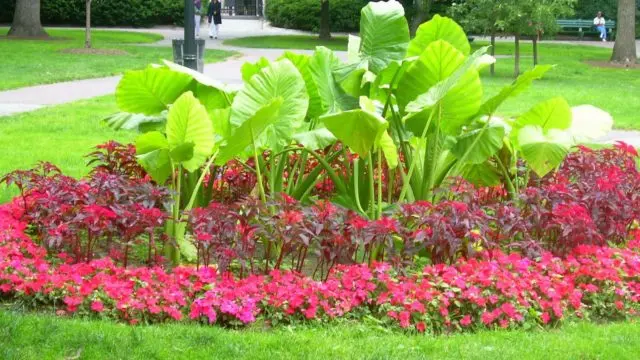
After planting, the seeds fall asleep and watered with a solution of a nitrogen preparation.
Work is carried out in the spring, when the soil has warmed up to +150 C, or in August. Periwinkle Kiff has a high rate of frost resistance, if the seeds are planted in moist soil, they will germinate quickly and overwinter safely.
Plants are regularly watered throughout the season. Periwinkle Kiff does not respond well to dry soil. Watering is carried out with a sufficient amount of water. The root circle should be moist, but without stagnant water. In regions with frequent rains, seasonal rainfall is enough for the crop.
Periwinkle can grow without fertilizers, but for better vegetation, it is recommended to feed the crop during planting with nitrogen. During flowering, complex mineral fertilizers are used; organic matter is added at the end of summer.
Diseases and pests
Kiff’s periwinkle is resistant to fungal and bacterial infections, the plant rarely gets sick. In the dry season, with a lack of moisture, the leaf plate loses turgor. But this happens with the wrong agricultural technology. To make the problem disappear, it is enough to water the culture.
Periwinkle is a poisonous plant, with bitter juice, so pests rarely appear on it. The only parasitic insect is the aphid. To get rid of its invasion, anthills are removed from the site, and the plant is treated with Kinmiks.
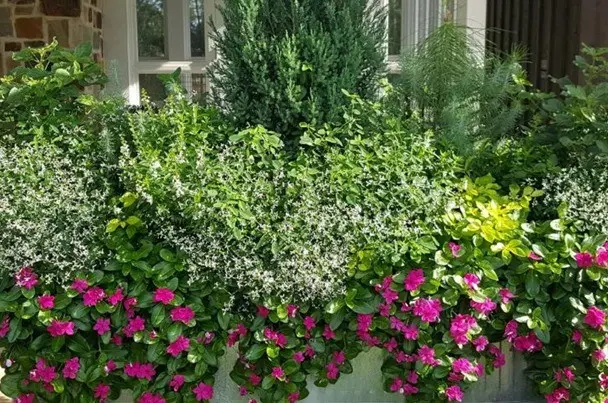
It is necessary to spray from aphids not only problematic bushes, but also nearby crops
Trimming
Stems that spoil the decorativeness of the plant are cut off after flowering. At the beginning of the season, corrective and sanitary pruning is carried out. Remove all dry and weak stems. If the periwinkle is too thick, cut off the twisted old stems in the central part. The culture is perennial, with intensive shoot formation, therefore it is rejuvenated once every 1 years. To do this, the green mass is completely removed in the fall.
Preparation for winter
The culture is frost-resistant, periwinkle rarely freezes. Even if the aerial part is damaged, a small fragment of a healthy root is enough for the plant to fully recover in a season. To protect from the cold, the young periwinkle is covered with spruce branches. An adult culture is carried out with water-charging irrigation and fertilized with a phosphorus agent.
Reproduction
For reproduction of periwinkle Kiff, not only the generative method is used. Culture can be obtained:
- Layers. In the spring, the lower stems are added dropwise, in August, the accustomed and rooted shoots are separated from the mother bush and planted in a permanent place of growth.
- Cuttings. They are harvested in the spring before flowering, this can be done during the formative pruning of the crown. The cuttings are immediately placed in fertile soil or in a container of water.
On the site, the cuttings are left until spring, they are well insulated for the winter. In water, the material gives roots in 3-4 weeks. After that, the cuttings can be planted in a flower pot or taken out to the site.
Less often they use the division of the mother plant, the plots quickly and safely take root.
Photo in the landscape
Kiff’s periwinkle is a dwarf form of culture. The plant is mainly used as a groundcover. Ideas and photos of Kiff’s periwinkle in garden design will help create an unusual corner in any area:
- Ground cover plants, including the Kiff variety, are often used to create a border.

- Periwinkle can be grown as a tamping of tall plants around the perimeter of the flower bed.

- Climbing plants are often used to decorate rockeries.

- An interesting solution – vertical gardening of longline structures

- Mixborder, created on the contrast of colors of different varieties, is sure to attract the eye.

- Ampel views on a portable structure are suitable for decorating any corner of the garden.

Conclusion
Periwinkle Kiffa is an ornamental crop that is used for growing in greenhouses, rooms and in an open area. The plant is frost-resistant, undemanding to lighting, is characterized by simple agricultural technology. Used for decoration of rockeries, for vertical gardening. With the help of seedlings create border compositions. Periwinkle is not susceptible to disease, rarely affected by pests.










